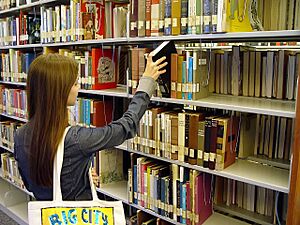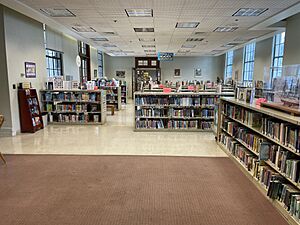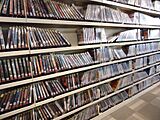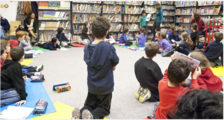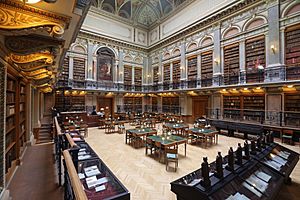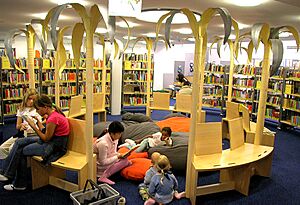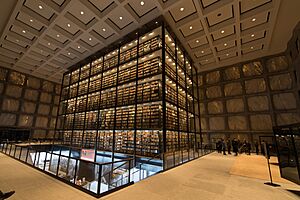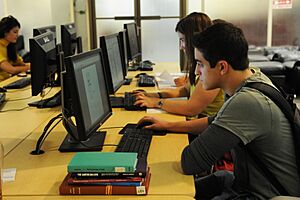Library facts for kids
A library is a collection of books, and other materials like movies and music, that people can access and borrow. Libraries can be a physical building, a website, or both. They offer materials in hard copies (like a printed book) or digital copies (like an e-book).
Most libraries have books and other items that you can check out and take home. They also have a reference section with materials like encyclopedias that you can only use inside the library. Besides books, you can find movies on DVD or Blu-ray, music on CDs, and audiobooks. Some libraries even have fun things like 3D printing stations.
Libraries are for everyone. They can be run by the government, a school, or even a private group. The people who work in libraries are called librarians. They are experts at finding information and can help you with your research or find your next favorite book.
Library buildings are great places to study. They have quiet areas for reading and common areas where you can work on group projects. They also provide free access to computers and the Internet.
Contents
A Brief History of Libraries
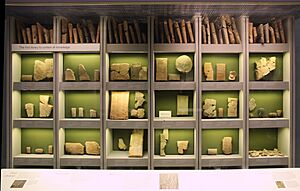
The story of libraries started thousands of years ago when people first began to organize collections of writing. The earliest libraries didn't have books, but clay tablets with a type of writing called cuneiform script. Some of these tablets, found in an area called Sumer, are from as far back as 2600 BC.
Personal libraries with written books first appeared in ancient classical Greece around the 5th century BC. Later, the great libraries in Constantinople and Alexandria became the most important in the world.
Throughout history, libraries have been very valuable. The libraries of Timbuktu, built in the 14th century, were famous and brought in smart people from all over the world. Sadly, because libraries hold a community's knowledge and stories, they have sometimes been destroyed by people who conquered a city. This was a way to erase the history of the people who lived there.
What Can You Find in a Library?
Libraries are more than just books! A library's collection can include:
- Books, magazines, and newspapers
- Manuscripts and maps
- Films, videotapes, DVDs, and Blu-ray Discs
- Music on CDs or cassettes
- E-books and audiobooks
- Databases for research
- Board games and video games
Libraries offer a quiet place to study and read. They also have spaces where you can work with friends on school projects. If you don't have a computer or internet at home, the library provides them for free. Libraries are for everyone, especially for people who can't afford to buy all the books or resources they need.
How Are Libraries Organized?
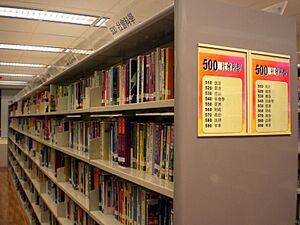
Have you ever wondered how you can find one specific book among thousands? Libraries use a library classification system to keep everything organized. Each book is given a special number and placed in a specific spot on the shelf. A common system is the Dewey Decimal Classification. This makes it easy to find what you're looking for.
Librarians are there to help you. They can answer your questions, help you with research, and suggest books you might like. Other library staff work behind the scenes to order new books and get them ready for the shelves.
Finding What You Need
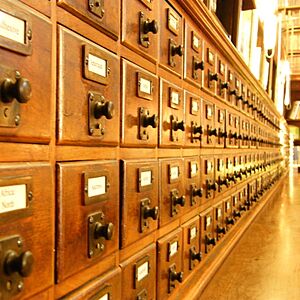
Before computers, people used a card catalog to find books. This was a big cabinet with many small drawers. Each drawer was filled with cards, and each card had information about a book and where to find it.
Today, most libraries use an online public access catalog (OPAC). This is an electronic catalog you can search on a computer. You can even search it from home through the library's website to see if a book is available before you go.
Types of Libraries
There are many different kinds of libraries, each with a special purpose.
Public Libraries
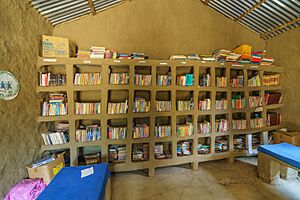
A public library serves everyone in a community. To borrow books, you usually need a library card, which is free. Public libraries are community centers. They offer fun programs like story time for toddlers, book clubs for teens, and computer classes for adults. They are a great place to learn, explore, and connect with others.
Some public libraries have bookmobiles, which are buses filled with books that travel to neighborhoods that are far from the library building.
Academic and School Libraries
Academic libraries are found in colleges and universities. They are mainly for students and teachers at the school. These libraries have books and resources for research and study. They often have special collections for different subjects, like science or art.
Your school library is another type of academic library. It has books and resources to help you with your classes and homework.
Children's Libraries
A children's library is a special section within a public library just for kids and teens. The books, furniture, and decorations are all designed for young readers.
Children's libraries host fun events like story time, summer reading programs, and craft sessions. These programs help kids develop a love for reading from a young age. Some libraries even have programs where you can read to a friendly therapy dog!
National Libraries
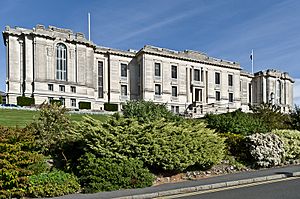
A national library is a special library run by a country's government. Its job is to collect and save all the books and publications created in that country. This is done through a rule called legal deposit, which requires publishers to send a copy of everything they print to the national library. You usually can't borrow books from a national library, but you can visit to see rare and important works.
Reference and Research Libraries
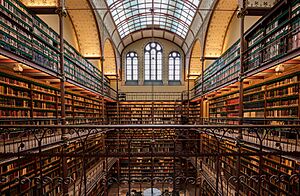
A reference library has books and materials that cannot be checked out. You use them inside the library building. These libraries are perfect for doing research because they have large collections of encyclopedias, dictionaries, and other reference works.
A research library is a large library that supports serious scholarly research. They are often part of a university or a national library. They collect a wide range of materials, including primary sources like original letters and documents.
Special Libraries
Some organizations have their own libraries for a specific purpose. These are called special libraries. For example, a hospital might have a medical library with books about health. A museum might have a library about art history, and a law firm will have a law library. These libraries are for the employees of that organization, but some may be open to the public.
Libraries in the Digital Age
The internet has changed how we use libraries. Today, libraries are a mix of physical and digital resources. You can visit a library's website to search its catalog, reserve books, and access e-books and audiobooks from home.
Libraries provide free computer and internet access, which is very important for people who don't have it. They also teach people how to find trustworthy information online, a skill known as information literacy.
As more information becomes digital, libraries are creating digital libraries. These are online collections of books, photos, and historical documents that anyone can access. This helps preserve important materials and makes them available to people all over the world.
See also
 In Spanish: Biblioteca para niños
In Spanish: Biblioteca para niños
 | Misty Copeland |
 | Raven Wilkinson |
 | Debra Austin |
 | Aesha Ash |


